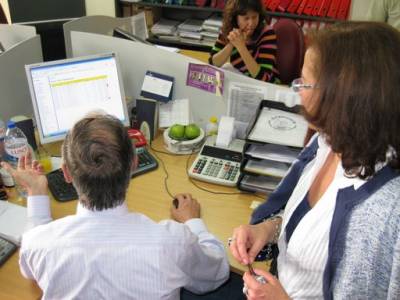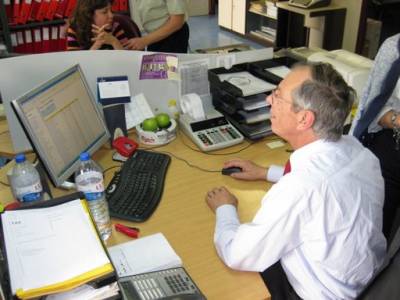Who we are
Our organization plays an important role in creating better understanding of the ship supply industry in Europe. Our organization is committed to transparent and open communication and inclusive dialogue between our members and European policymakers.
SPEECH: What is OCEAN? by OCEAN Chairman Stefan Ericson (2007-2011)
Our market - our industry
Today we represent over 750 ship chandlers (more than 250,000 jobs) who supply a wide range of goods to several hundred thousand ships annually in most of the 1,200 merchant ports throughout the 70,000 km of the European coastline. Ship suppliers provide a 24-hour service throughout the year and are an essential element of modern maritime trade and a vibrant shipping industry.
OCEAN speaks on European policy matters affecting our daily business.Our objectives are to:
- represent the interests of all ship suppliers in the European Union before EU institutions on topics relating to the ship supply industry.
- protect and defend its members' economic interests inside the European Union.
- get heard on all topics relevant to the ship supply industry.
- ensure that every legislation published by an EU entity is implemented consistently across the Union.
- argue against any new EU institution proposals that are ludicrous and, if necessary, involve the National Associations.
The OCEAN Board meets twice a year (at least) to
- discuss a broad range of developments in ship supply, its European policies, laws, and guidance changes,
- to organise the work of the association,
- to review the work of the Secretariats,
- to agree on priorities for the short, medium and long term,
- to set policy and focus priorities.
The Board consists of one representative from each member association.
The position of treasurer is one of the most significant in OCEAN. The treasurer is accountable for handling financial concerns and ensuring the organisation has the funds to achieve its objectives. This includes anything from collecting and pursuing membership fees to paying invoices to ensure the organisation has sufficient funds to pay personnel and contractors. In addition to these responsibilities, the treasurer may be responsible for monitoring the ratio of incoming to outgoing funds. This offers him or her a sense of how long it will be before the organisation runs out of money and what must be done before this occurs. Additionally, the treasurer must guarantee that all financial transactions are precise and lawful. This involves collecting all vendor receipts, verifying that they correspond with purchases, and reporting management of any inconsistencies. The OCEAN treasurer may be needed to oversee tax law compliance and establish the budget for the next year.
The OCEAN Secretary-Office General's
Brussels, where the organization's headquarters are located, also acts as the organization's office for European affairs and advocacy. The Secretary-General is its leader. The Secretary-General is responsible for keeping daily communication with policymakers and any other relevant entities necessary to achieve the organization's aims and objectives. They keep OCEAN abreast of any new developments and subjects pertaining to the ship supply business, as well as provide suggestions for future measures and offer advice on ship supply and EU policy efforts. Additionally, the OCEAN Secretariat oversees the European lobbying activities of its member states. The ISSA Secretariat offers administrative support to the organisation, ensuring that the OCEAN Board meeting goes well and that strong relationships are maintained with other international ship supply organisations. It is responsible for membership administration, meeting organisation, and minute-taking. It is responsible for internal OCEAN member communications.
The subgroup on Customs comprises customs specialists with decades of expertise. This group closely monitors the Union Customs Code (UCC) talks at its ship supply advice as well as the e-customs implementation. The group meets frequently to address ship supply-related concerns and to communicate with the European Commission and European Parliament.
Veterinary Affairs - (Subgroup)
Ship provisioning is also referred to as victualling. The word "victual" signifies "to provide with food" or "to store food." It also refers to "food supply and supplies," which is one of the key responsibilities of modern ship providers. Therefore, a subgroup of the CEVVT exists to handle veterinary & quality and biosecurity issues. This group of food and drink specialists is based on the previous OCEAN Veterinary Affairs Working Group, which was established in 1992 in response to the provisions of EU Council Directive 90/675 of 10 December 1990, which were deemed detrimental to free international trade and the ship supply industry in particular. The group addresses animal diseases and veterinary border control legislation.
Our international dimension: ISSA
The International Ship and Service Association (ISSA) is a global organisation that represents more than 2,000 ship providers all over the globe. The Association was founded in 1955, and 2015 marked its 60th year of providing services to the marine sector. ISSA has full membership from 40 different national organisations of ship suppliers across the world, and it also has associate membership in 51 more countries where there is no national organisation.
Get in touch
The OCEAN Secretariat in Brussels can be contacted by post and e-mail by writing to:
OCEAN
c/o UECBV
Rue de la Loi 81A
4th Floor
1040 Brussels
Belgium
E-mail: info@shipsupply.eu.



